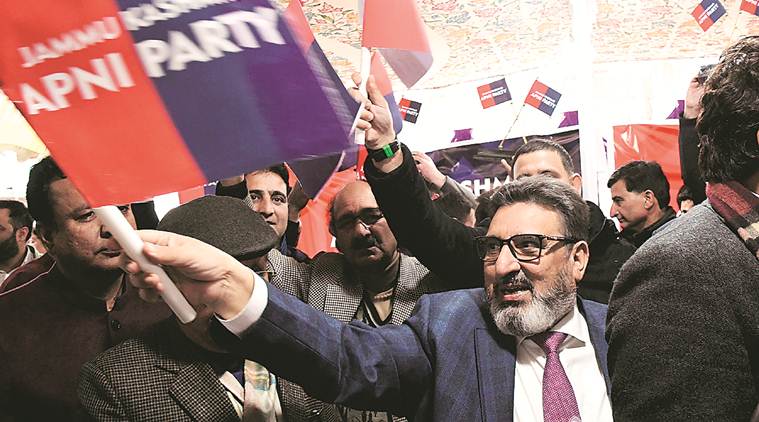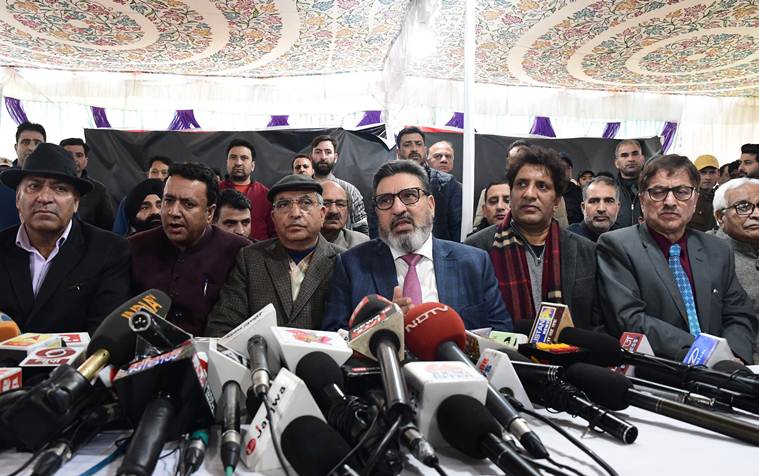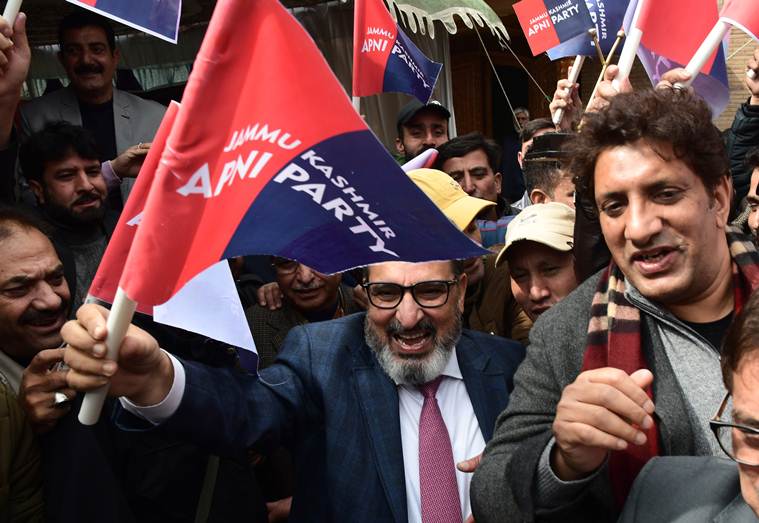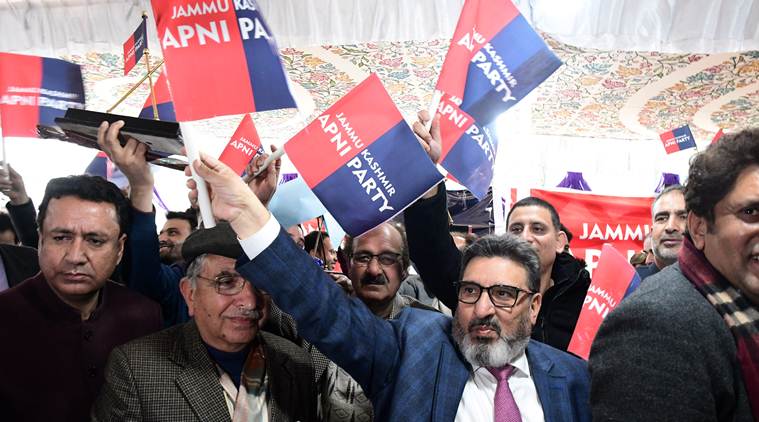
According to sources in the Ministry of Home Affairs (MHA), a month into the shutdown imposed following August 5 decisions and incarceration of key political leaders in J&K, New Delhi had begun to feel the need for political engagement with people there. It was felt that despite all promises made by the Centre, acceptance of Kashmir’s new status and credibility of the government’s assurances could only be established through political engagement by local politicians.
 Former PDP minister Altaf Bukhari and other leaders at the launch of Apni Party in Srinagar on Sunday. (Express photo by Shuaib Masoodi )
Former PDP minister Altaf Bukhari and other leaders at the launch of Apni Party in Srinagar on Sunday. (Express photo by Shuaib Masoodi )
“Even though Home Minister Amit Shah said on multiple occasions that panchayat polls had already started the political process, and that new leaders would emerge from there, the government knew it was easier said than done,” an MHA official said. “They had little political influence on ground, and practically no acumen to handle the fragile political situation in the new Union Territory.”
It was decided back in September 2019 that political engagement would have to be done through leaders of mainstream parties, sources said. “Various options were considered – from known faces to political pariahs,” an official from Kashmir said. “Even the Abullahs (former J&K CMs Farooq and Omar) were given a thought, but Delhi was not keen on engaging with either Abdullahs or the Muftis (former CM Mehbooba Mufti’s family). Shah Faesal (former IAS officer who quit to join politics), with his fiercely critical media interviews and attempt to go to Turkey, had become a persona non-grata, while Sajjad Lone (former J&K MLA) was considered to have limited influence beyond Kupwara.”
 Bukhari was expelled from the PDP in January 2019 following allegations that he ‘inspired and led dissent in the party’. (Express photo by Shuaib Masoodi)
Bukhari was expelled from the PDP in January 2019 following allegations that he ‘inspired and led dissent in the party’. (Express photo by Shuaib Masoodi)
Altaf Bukhari’s luncheon meet with National Security Adviser Ajit Doval in October 2019 in Delhi was a noteworthy development in this process, sources said. The choice of Bukhari, sources suggested, was both due to his acumen at political jugglery and availability.
“It’s not that Delhi had to bring these people together – they were already available,” an MHA official said. “Bukhari had been making noises for political alternatives since the collapse of the PDP-BJP government in 2018. We are only facilitating it. Those who need security are being given; those who need to be released are being released.”
Story continues below this ad
The only nudge from the security establishment, it is learnt, is that the new party must start a political dialogue using the language of governance. Agitating over Articles 370 and 35A is a no-go zone for Apni Party, sources said. However, the party’s articulation on protection of jobs and land and restoration of statehood are likely to be indulged by New Delhi.
 At the launch, Altaf Bukhari said the party would preserve the self-respect and dignity of people of the Union Territory. (Express photo by Shuaib Masoodi)
At the launch, Altaf Bukhari said the party would preserve the self-respect and dignity of people of the Union Territory. (Express photo by Shuaib Masoodi)
The Centre is, in fact, willing to grant these demands in due course, sources maintained.
The MHA official said: “After the August 5 decisions, there was total political vacuum on the ground (in the Valley). The PDP was discredited, and the NC was absent on ground, with most of its leaders behind bars. It had even stalled development work, as political workers on the ground push deputy collectors to complete government projects.”
Stating that Apni Party comprises all the known political forces of the erstwhile state, the MHA official said, “They will hopefully start development work as well – we hope that will build their credibility.”
Story continues below this ad
An official from Kashmir, however, cautioned that a political outfit that does not engage with the people on core issue of the Kashmir problem will find it difficult to gain the confidence of all sections. “Even though a similar experiment in the past gave good results, we must remember that the party had more freedom,” he said.
 Former PDP minister Altaf Bukhari at the launch of his ‘Apni Party’ in Srinagar on Sunday. (Express photo by Shuaib Masoodi)
Former PDP minister Altaf Bukhari at the launch of his ‘Apni Party’ in Srinagar on Sunday. (Express photo by Shuaib Masoodi)
Senior BJP leader Ram Madhav, who played a key role in BJP’s political decisions in J&K, told The Indian Express: “There is a large section of political dispensation in the Valley which has been longing to resume political activities. We only see this new development as an expression of their desire for normal political activities…. Leaders of the two major regional parties who are not in prison got together and formed this new party to resume their political activities.”
Madhav did not want to comment about prospects of the new party, but added, “We (BJP) always wanted normal political activities in the Valley. But our focus will be on expanding our footprints as BJP.”
Sources in BJP said Apni Party had the government’s backing, as it wanted to see “political normalcy” in the Valley. Even though questions were raised on credibility of its leaders, both BJP and the government hope that more leaders will jump the bandwagon soon if it is successful.
Story continues below this ad
“This was an experiment and people there, especially those from the main parties who are not in jail, are very keen to start their political activities in the new situation,” a source said. “We are happy with the development. We are quite sure that others who do not want to be with BJP but want to continue their politics will join slowly. They just want to see how it is shaping up. Once it becomes a viable option, there will be more (people joining),” said a source.
Sources also said some in the government is quite disappointed that senior PDP leader and former deputy chief minister Muzaffar Hussain Baig, who was expected to be on board for the Altaf Bukhari-led party did not join. “But we hope that he would also be a part of it,” the source said.

 Former PDP leader Altaf Bukhari at the launch of ‘Apni Party’ in Srinagar on Sunday. (Express photo by Shuaib Masoodi)
Former PDP leader Altaf Bukhari at the launch of ‘Apni Party’ in Srinagar on Sunday. (Express photo by Shuaib Masoodi)
 Former PDP minister Altaf Bukhari and other leaders at the launch of Apni Party in Srinagar on Sunday. (Express photo by Shuaib Masoodi )
Former PDP minister Altaf Bukhari and other leaders at the launch of Apni Party in Srinagar on Sunday. (Express photo by Shuaib Masoodi ) Bukhari was expelled from the PDP in January 2019 following allegations that he ‘inspired and led dissent in the party’. (Express photo by Shuaib Masoodi)
Bukhari was expelled from the PDP in January 2019 following allegations that he ‘inspired and led dissent in the party’. (Express photo by Shuaib Masoodi) At the launch, Altaf Bukhari said the party would preserve the self-respect and dignity of people of the Union Territory. (Express photo by Shuaib Masoodi)
At the launch, Altaf Bukhari said the party would preserve the self-respect and dignity of people of the Union Territory. (Express photo by Shuaib Masoodi) Former PDP minister Altaf Bukhari at the launch of his ‘Apni Party’ in Srinagar on Sunday. (Express photo by Shuaib Masoodi)
Former PDP minister Altaf Bukhari at the launch of his ‘Apni Party’ in Srinagar on Sunday. (Express photo by Shuaib Masoodi)





